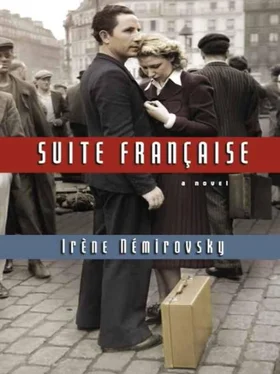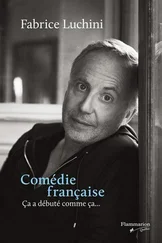Irène Némirovsky - Suite Française
Здесь есть возможность читать онлайн «Irène Némirovsky - Suite Française» весь текст электронной книги совершенно бесплатно (целиком полную версию без сокращений). В некоторых случаях можно слушать аудио, скачать через торрент в формате fb2 и присутствует краткое содержание. Жанр: Историческая проза, на английском языке. Описание произведения, (предисловие) а так же отзывы посетителей доступны на портале библиотеки ЛибКат.
- Название:Suite Française
- Автор:
- Жанр:
- Год:неизвестен
- ISBN:нет данных
- Рейтинг книги:4 / 5. Голосов: 1
-
Избранное:Добавить в избранное
- Отзывы:
-
Ваша оценка:
- 80
- 1
- 2
- 3
- 4
- 5
Suite Française: краткое содержание, описание и аннотация
Предлагаем к чтению аннотацию, описание, краткое содержание или предисловие (зависит от того, что написал сам автор книги «Suite Française»). Если вы не нашли необходимую информацию о книге — напишите в комментариях, мы постараемся отыскать её.
"A book of exceptional literary quality… it has the kind of intimacy found in the diary of Anne Frank."-The Times Literary Supplement
"Heroic… a novel about a nightmare in which the author is entirely embedded."-ANITA BROOKNER, The Spectator
"An exceptionally forceful and frank testimony… a real find. A masterpiece."-L'Express
"Remarkable as the story of the publication of Suite Française is, it will finally be of anecdotal interest compared with the importance of the book. Here is the work of a fine novelist at the top of her form, writing about the fate of her adopted country with a pitiless clarity."-Evening Standard
Suite Française — читать онлайн бесплатно полную книгу (весь текст) целиком
Ниже представлен текст книги, разбитый по страницам. Система сохранения места последней прочитанной страницы, позволяет с удобством читать онлайн бесплатно книгу «Suite Française», без необходимости каждый раз заново искать на чём Вы остановились. Поставьте закладку, и сможете в любой момент перейти на страницу, на которой закончили чтение.
Интервал:
Закладка:
She sat motionless until evening, as if riveted to the spot, watching everyone who crossed the street. In the evening… not a single sound. "I haven't heard even the faintest creak from the third step," thought Madame Angellier, "the one I hear when Lucile leaves her room and goes out into the garden. The silent, oiled doors are her accomplices, but that faithful old step speaks to me. No, there's not a sound. Are they together already? Maybe they're meeting later?"
The night passed. Madame Angellier was overcome with burning curiosity. She slipped out of her bedroom and placed her ear against the officer's door. Nothing. Not a single sound. If she hadn't heard a man's voice somewhere in the house earlier that evening, she might have thought he hadn't come back yet. But nothing got past her. Any man in the house who wasn't her son was an insult to her. There was a smell of foreign tobacco; she went pale and raised her hands to her forehead, like a woman who thinks she's about to faint. Where is he, the German? Closer than usual since the smoke is coming in through the open window. Is he going through the house? Perhaps he's leaving soon and knows it, so he's choosing the furniture he'll take: his share of the spoils. Didn't the Prussians steal the grandfather clocks in 1870? Today's soldiers won't have changed that much. She imagined his sacrilegious hands rifling through the attic, the larder and the wine cellar.
Thinking about it, it was the wine cellar that worried Madame Angellier most. She never drank wine; she recalled having had a sip of champagne for Gaston's First Communion and at her wedding. But wine was somehow part of their heritage and, as such, was sacred, like everything destined to continue after we die. That Château-d'Yquem, that… she'd been given those wines by her husband to pass on to her son. They had buried the best bottles in the sand, but that German… Who could tell? Instructed by Lucile perhaps… Let's go and see… Here's the wine cellar with its door and iron locks, like a fortress. Here's the hiding place only she knows about by a cross marked on the wall. No, everything seems in order here as well. Nevertheless, Madame Angellier's heart is pounding furiously. It is clear that Lucile has just been down to the cellar; her perfume lingers in the air. Following its scent, Madame Angellier goes back upstairs, through the kitchen, the dining room and, finally, on the staircase comes face to face with Lucile carrying a plate, a glass and an empty wine bottle. So that's why she went down into the wine cellar and the larder, where Madame Angellier had thought she heard footsteps.
"A romantic little supper?" said Madame Angellier in a voice as low and stinging as a whip.
"I beg you, please be quiet. If you knew…"
"And with a German! Under my own roof! In your husband's house, you miserable…"
"Be quiet, won't you! Can't you see the German isn't back yet? He'll be here any minute. Let me go and tidy up. In the meantime, you go upstairs, open the door to the old playroom and see who's in there… Then, after you've seen, meet me in the dining room. I was wrong, very wrong to act without telling you; I had no right to put your life in danger…"
"You've hidden that farmer here… the one accused of the murder?"
At that very moment they heard the regiment. There was the hoarse shout of orders being given and immediately afterwards the sound of the German officer coming up the steps to the house. His walk was unmistakable. No Frenchman could produce that hammering of boots, that rattling of spurs. It was a walk that could only belong to a proud conqueror, striding over the enemy's cobblestones, joyfully trampling the defeated land.
Madame Angellier opened the door to her own room, pushed Lucile inside, followed her in and turned the key. She took the plate and glass from Lucile, rinsed them in her dressing-room washstand, carefully dried them and put away the bottle after checking the label. Table wine? Yes, well done! She's prepared to be shot for hiding a man who killed a German, thought Lucile, but she wouldn't be happy to give him a good bottle of Burgundy. Thank goodness it was dark in the cellar and I was lucky enough to take a bottle of red wine worth only three francs. She remained silent, waiting with intense curiosity to hear what Madame Angellier would say. She couldn't have kept the presence of a stranger hidden from her much longer: this old woman could see through walls.
Finally, Madame Angellier spoke. "Did you think I would hand that man over to the Germans?" she asked. Her pinched nostrils were trembling; her eyes sparkled. She seemed happy, elated, almost mad, like a former actress who is once again playing the role she starred in long ago and whose nuances and gestures are second nature to her. "Has he been here long?"
"Three days."
"Why didn't you say anything to me?"
Lucile didn't reply.
"You're mad to have hidden him in the blue room. He should stay in here. Since all my meals are brought to me upstairs, there is no risk of anyone challenging you: you have your excuse. He can sleep on the sofa in the dressing room."
"But think about it, Mother! If he's found in our house the risk is terrible. I can take all the blame, say that you didn't know what I was doing, which is actually the truth, but if he's in your room…"
Madame Angellier shrugged her shoulders. "Tell me everything," she said, with an eagerness in her voice that Lucile hadn't heard for a long time. "Tell me exactly how it all happened. All I know is what the police said. Whom did he kill? Was it just one German? Did he wound any others? Was it at least a high-ranking officer…?"
She's in her element, thought Lucile. She's so eager to do her duty in the call to arms… Mothers and women in love: both ferocious females. I'm not a mother and I'm not in love (Bruno? No. I mustn't think of Bruno now, I mustn't…), so I can't see things in the same way. I'm more detached, colder, calmer, more civilised, I still believe that. And also… I can't imagine that all three of us are really risking our lives. It seems so melodramatic, so extreme. Yet Bonnet is dead, killed by a farmer whom some would treat as a criminal and others as a hero. And what about me? I have to choose. I've already chosen… in spite of myself. And I thought I was free…
"You can question Sabarie yourself, Mother," she said. "I'll bring him to you. Make sure you don't let him smoke; the Lieutenant will smell someone else's tobacco in the house. I think that's the only danger; they won't search the house; they would scarcely believe anyone would dare hide him here in the village. They'll raid the farms. But we could be denounced."
"Frenchmen don't denounce one another," the old woman said proudly. "You've forgotten that, my girl, since you got friendly with the Germans."
Lucile remembered something Lieutenant von Falk had told her in confidence: "The very first day we arrived," he'd said, "there was a package of anonymous letters waiting for us at Headquarters. People were accusing one another of spreading English and Gaullist propaganda, of hoarding supplies, of being spies. If we'd taken them all seriously, everyone in the region would be in prison. I had the whole lot thrown on to the fire. People's lives aren't worth much and defeat arouses the worst in men. In Germany it was exactly the same." But Lucile said nothing of this to her mother-in-law and left her to make up the sofa in the dressing room. She looked impassioned, light-hearted and twenty years younger. Using her own mattress, pillow and her best sheets, Madame Angellier lovingly prepared a bed for Benoît Sabarie.
20
For a long time the Germans had been making arrangements for a great celebration at the Château de Montmort. It was to take place on the night of 21 June. This was the anniversary of the regiment's arrival in Paris, but no Frenchman was to know this was the reason the date had been chosen: the commanding officers had given orders to respect French national pride. All races are aware of their own faults; they know them better than even the most malevolent foreign observer. In a friendly conversation, a young Frenchman had recently told Bruno von Falk: "We Frenchmen have very short memories; this is both our strength and our weakness! We forgot that after 1918 we were the victors and that was our downfall; we'll forget after 1940 that we were defeated, which will perhaps be our salvation."
Читать дальшеИнтервал:
Закладка:
Похожие книги на «Suite Française»
Представляем Вашему вниманию похожие книги на «Suite Française» списком для выбора. Мы отобрали схожую по названию и смыслу литературу в надежде предоставить читателям больше вариантов отыскать новые, интересные, ещё непрочитанные произведения.
Обсуждение, отзывы о книге «Suite Française» и просто собственные мнения читателей. Оставьте ваши комментарии, напишите, что Вы думаете о произведении, его смысле или главных героях. Укажите что конкретно понравилось, а что нет, и почему Вы так считаете.

![Константин Бальмонт - Константин Бальмонт и поэзия французского языка/Konstantin Balmont et la poésie de langue française [билингва ru-fr]](/books/60875/konstantin-balmont-konstantin-balmont-i-poeziya-francuzskogo-yazyka-konstantin-balmont-et-thumb.webp)










